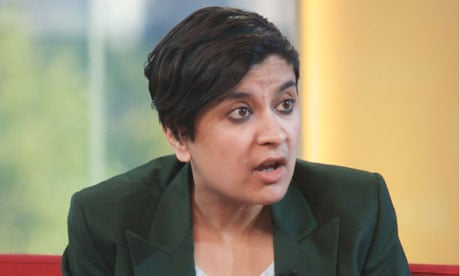A key adviser to the Leveson report, the civil rights campaigner Shami Chakrabarti, has hit out against politicians and newspaper barons, accusing them of letting down the public over promises to set up a new press watchdog.
One of six assessors on the Leveson inquiry and the director of Liberty, Chakrabarti branded plans to launch a watchdog backed by a royal charter as "bizarre" and said that all politicians and the newspaper industry has done is to create "confusion and resentment" by putting forward rival proposals.
"A royal charter is constitutionally inappropriate, undemocratic, opaque and in no way fit for this purpose," Liberty said in a submission to the Department for Culture, Media and Sport.
Chakrabarti called on politicians and the press to stop prevaricating but warned that neither charter would work.
"Six months on and still no sign of any real progress – and current squabbling over bizarre royal charters has achieved nothing but confusion and resentment. The Leveson report contained an effective blueprint for a decent self-regulator so why hasn't it been set up?" said Chakrabarti.
She was making her comments ahead of Thursday's deadline for responses to the government on the industry's proposal to launch an independent self-regulator backed by its its own royal charter, instead of the version agreed between the three main political parties and Hacked Off in a late night deal in March.
Chakrabarti said that the victims of the press and ethical journalists "need protection" and that the "public needs confidence restored".
"Everyday politicians and press barons prevaricate is another letting everyone down," Chakrabarti added.
Liberty said it had fundamental issues with the concept of a royal charter, which was first hatched by David Cameron's policy tsar Oliver Letwin as a means to set up a regulator that was not backed by statute but had more checks in place than the current Press Complaints Commission.
In a statement, Liberty said: "The limitations inherent to a royal charter make it difficult to achieve a truly independent recognition body. As is obvious from both charters, it creates an overly complex and bureaucratic system – which reflects the interests of the creator. For example, the press model would have the body funded by the press, whereas the politicians' version would be funded from the exchequer."
In its a submission to the Department for Culture, Media and Sport, Liberty said the two competing royal charters also appear to be in breach of the privy council's own criteria for assessing whether such a document should be granted.
Liberty also has issues with the proposed recognition panel, which would audit the watchdog's performance, and with plans for punitive fines being imposed on publishers who chose not to sign up to the press regulator.
It says the role of recognition should be performed by the judiciary "to ensure independence from press and politicians".
The involvement of the courts would eliminate the need for a bureacratic appointments panel as currently envisaged by the government and the press, according to Liberty.
Liberty supports punitive damages being awarded in the high court for breaches of confidence or breaches of privacy but says "failure to join an effective regulatory body not lead automatically to an award of exemplary damages".
Exemplary damages were proposed in the Leveson report as part of the "carrot and stick" approach to self-regulation. Lord Justice Leveson believed the threat of huge fines in the high court would be an incentive to join the regulator but this has been challenged by the press and by several peers, including Lord Lester, who believes it would be a breach of European law.
Daily Mail publisher Associated Newspapers has also said it is implacably opposed to exemplary damages and has considered boycotting a regulation system that included. Other newspapers including the Guardian have also expressed opposition to punitive damages.
David Cameron has promised to consider the industry's royal charter proposal which emerged as a surprise development last month.
Hacked Off has called on Cameron to stick with the original royal charter plan, but behind the scenes every effort is being made to find a solution that will win the pressure group's support and that of newspapers including the Guardian and the Financial Times, which have some reservations about the industry's royal charter.
One source said: "A deal is being shaped, but what shape it will take is not known yet."
To contact the MediaGuardian news desk email media@theguardian.com or phone 020 3353 3857. For all other inquiries please call the main Guardian switchboard on 020 3353 2000. If you are writing a comment for publication, please mark clearly "for publication".

Comments (…)
Sign in or create your Guardian account to join the discussion